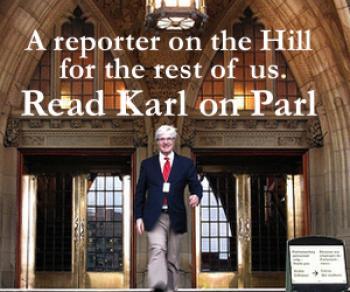Bernard Valcourt was a Minister in Brian Mulroney’s Progressive Conservative government.
Since 2011 he has held a junior portfolio in the current Harper Conservative government.
On Friday the Prime Minister named him the new Minister for Aboriginal Affairs.
As Prime Minister, Valcourt’s one-time boss Brian Mulroney was sincerely interested in Aboriginal issues.
The former Progressive Conservative PM set up the Royal Commission on Aboriginal Peoples headed by former Assembly of First Nations National Chief George Erasmus and Quebec Judge René Dussault.
The exhaustive Report of that Royal Commission contained proposals that were at once far-reaching and radical, and eminently practical.
The Report bears reading (or re-reading) by anyone interested in the centuries’ long struggles of Canada’s First Peoples.
To start with, the Report notes where there has been some success in the First Nations relationship with Canada (and with the provinces).
For instance, it cites the case of the Quebec James Bay Cree, who have a significant measure of self-government, royalties from natural resource exploitation (in particular hydro-electricity), continued land-based harvesting activities on traditional lands, and a thriving indigenous small business sector.
Erasmus and Dussault contrast this success with the sorry state of the Ontario Cree, just the other side of the provincial border.
Their Royal Commission recommendations included: a series of flexible and adaptable models of self-government; a number of different ways in which First Nations’ access to, control over and ownership of land and resources should be legally recognized; and a muscular and realistic plan for Aboriginal economic development.
Here is one small passage from that rich and well-documented Report, dealing with economic development:
As things stand, Aboriginal communities are subject to a changing array of economic development programs, most of them managed from distant government offices. They must tailor their ideas for stimulating the economy to program criteria set by external authorities.
We call on federal and provincial governments to enter into long-term development agreements with Aboriginal nations to provide support, advice and stable funding for economic development. Aboriginal nations would design programs, make investment decisions, and be accountable to their people for managing these resources.
Regaining control of economic matters without the human resources and capacity to manage them would spell trouble for Aboriginal nations. They must be helped to develop the personnel and the regional and national institutions they need to invest in and manage businesses in specific sectors — resource extraction industries, agriculture, communications, tourism, and so on.
As with so much other good work on Aboriginal issues, the work of the Royal Commission pretty much all came to naught.
Now, a Minister who was part of the Government that established the Royal Commission is charged with Aboriginal Affairs.
Bernard Valcourt should dust that Royal Commission Report off and read it very carefully.
Progressive Conservative MPs of Mulroney’s time report that the former Prime Minister would often unashamedly lecture his caucus on Canada’s responsibilities toward its First Peoples.
Valcourt was in the room back then. For part of that time he was even Associate Minister for Indian Affairs (as it was then called).
Can we hope that his experience taught him something?
Is there a chance his well-known reputation for toughness and tenacity will make Valcourt not so much an apologist for the government’s policies toward First Nations as an advocate within the Government for Aboriginal rights and interests?
That may be a lot to hope for.
As a start, one hopes Valcourt and those advising him will do some serious homework. They should consider the Royal Commission Report, and, of more recent vintage, there are the Auditor General’s Report of spring 2011 and the National Panel on First Nations’ Education that reported just a little more than a year ago.
We have mentioned the latter two quite a bit in this space. Both are very helpful, if somewhat narrowly focused.
The Royal Commission Report gives the big picture.
The bureaucrats of the Aboriginal Affairs Department must have a few copies of the Report lying around. One hopes that one of those copies will be on the new Minister’s desk on Monday morning.



